Assad is in Moscow, Russian state media reportspublished at 17:56 Greenwich Mean Time
Breaking
Deposed Syrian President Bashar al-Assad and his family have arrived in Moscow, Russian state media agencies report, citing sources in the Kremlin.
Reports also say that Assad and his family have been granted asylum by Russia.
The BBC has not been able to independently verify the information.
Why did the rebels succeed?published at 17:37 Greenwich Mean Time
David Gritten
BBC News
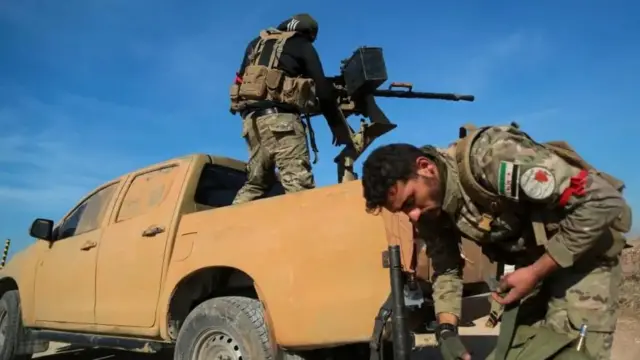 Image source, Reuters
Image source, Reuters
For the past four years, it had felt like the civil war was effectively over.
Assad’s government had regained control over most of Syria’s cities with the help of Russia, Iran and Iranian-backed militias like Hezbollah, and the front lines were largely frozen.
However, large parts of the country were still out of the government’s control.
Hayat Tahrir al-Sham and its allies said on 27 November that they had launched an offensive to “deter aggression”, accusing the government and allied Iran-backed militias of escalating attacks on civilians.
But it came at a time when the government had been weakened by years of war, sanctions and corruption – with allies Russia and Iran preoccupied by other conflicts.
The Iran-backed group Hezbollah had recently suffered from Israel’s offensive in Lebanon. Israeli strikes had eliminated Iranian military commanders in Syria, and Russia was distracted by the war in Ukraine.
Without them, Assad’s forces were left exposed.
A scene few could have imagined: Jawlani in the Umayyad Mosquepublished at 17:28 Greenwich Mean Time
Feras Kilani
BBC Arabic Special Correspondent, in Damascus
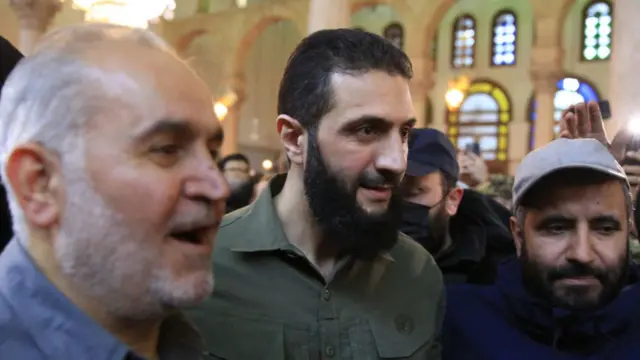 Image source, Getty Images
Image source, Getty Images
It was a moment no one could have imagined just 24 hours earlier. Without prior warning or arrangements, Abu Mohammad al-Jawlani, the leader of Hay’at Tahrir al-Sham (HTS), made a surprising visit to the Great Umayyad Mosque in Old Damascus.
Seeing him from just a few metres away felt surreal. This mosque had long been a symbolic site where Bashar al-Assad and his late father, Hafez al-Assad, would often perform Eid prayers—a symbolic act for the rulers of the capital.
Surrounded by hundreds of fighters and personal guards, Jawlani entered the mosque, performed the Maghrib prayer, and delivered a brief address to those gathered around him amid chants of victory and “Allahu Akbar”.
Earlier, Jawlani had toured key areas of the city, including the iconic Umayyad Square, surrounded by Syria’s most significant government institutions, such as the General Staff Headquarters and state television. There, he prayed before continuing his tour. I was present in the square, but his guards kept everyone at a distance as he approached.
While many Syrians expressed joy at what they see as a turning point, their celebrations were tinged with apprehension about what lies ahead. The acrid smell of gunpowder still fills the air in Damascus, a city locked down and nearly deserted. As Jawlani’s tour unfolded, plumes of smoke rose into the sky, obscuring the future and raising questions about the days and weeks to come.
Dressed in his military attire, Jawlani projected the image of a ruler in Damascus, standing over a city—and a nation—that had been under the grip of Bashar al-Assad and the Baath regime for decades. In less than two weeks, that regime has crumbled, leaving little more than a memory.
Yet, with Jawlani’s controversial jihadist past, the question remains: can he succeed in governing the capital and its surrounding territories?
Who is rebel leader Abu Mohammed al-Jawlani?published at 17:20 Greenwich Mean Time
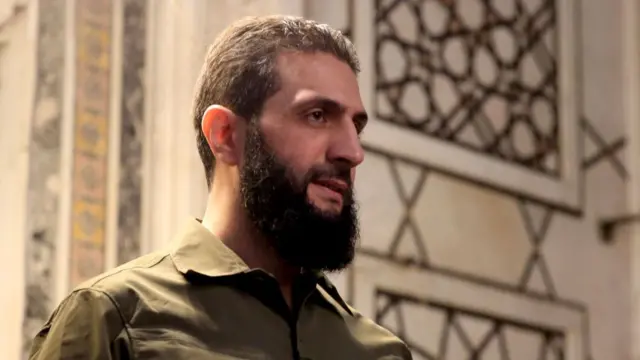 Image source, Getty Images
Image source, Getty Images
We’re bringing you more now on Abu Mohammed al-Jawlani, the leader of Hayat Tahrir al-Sham (HTS), who made a speech at the Umayyad Mosque in Damascus earlier.
In 2013, the US named Jawlani as a specially designated global terrorist and offered a $10m reward for information that leads to his capture.
But the rebel leader has for years endeavoured to shift the perception of his organisation to one that could be accepted by Syrians as an alternative to the Assad regime.
His Islamist militant group has played a key role in bringing down the Assad regime. HTS was set up in 2012 under a different name, the al-Nusra Front, and pledged allegiance to al-Qaeda the following year.
In 2016, Al-Nusra broke ties with al-Qaeda, and it took the name Hayat Tahrir al-Sham when it merged with other factions a year later.
But the UN, US, UK and a number of other countries continued to consider HTS as an al-Qaeda affiliate and frequently refer to it as al-Nusra Front.
Collapse of Assad’s cruel dictatorship offers opportunities, EU president sayspublished at 17:09 Greenwich Mean Time
 Image source, EPA
Image source, EPA
European Commission President Ursula von der Leyen says the fall of President Bashar al-Assad’s “cruel dictatorship” will offer opportunities, but “not without risks”.
She says Europe will help safeguard “national unity” and rebuild “a Syrian state that protects all minorities”.
“We are engaging with European and regional leaders and monitoring developments,” she adds.
Watch: ‘First time I’ve come to Syria without fear of arrest’published at 16:54 Greenwich Mean Time
Lina Sinjab
Reporting from Damascus
BBC Middle East Correspondent Lina Sinjab, who is from Syria, is in Damascus today taking in the aftermath of the fall of the Assad regime.
Earlier, she told the BBC News channel that this is “the first time I drove through the border crossing without fear of detention, without fear of arrest”.
You can hear more from Lina in the video below.
‘First time I’ve come to Syria without fear of arrest’
Another explosion heard in Damascuspublished at 16:41 Greenwich Mean Time
Barbara Plett Usher
Reporting from Damascus
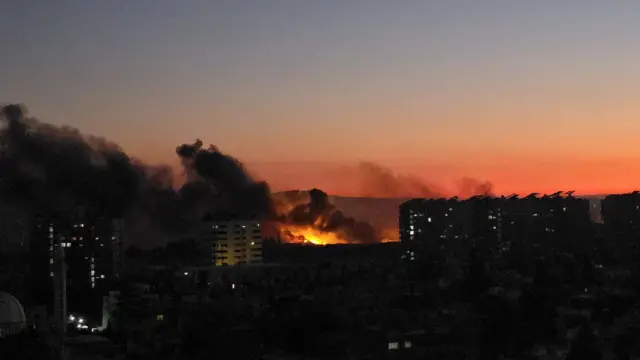
The sound of another massive explosion in Damascus. This is the second one we’ve heard.
Earlier reports (see previous post) said Israel had struck a major security complex in the Kafr Sousa district along with a research centre where it had previously said Iranian scientists developed missiles, but we haven’t been able to verify that.
We did see a big fire that seemed to set off smaller explosions.
Unconfirmed reports of Israeli strikes on Damascuspublished at 16:39 Greenwich Mean Time
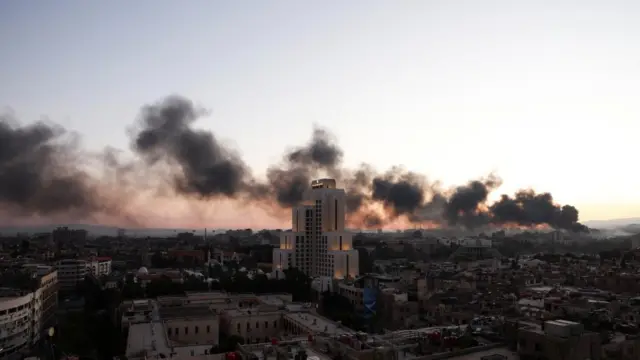 Image source, Reuters
Image source, Reuters
As we reported earlier, strikes have been heard in Damascus in the past few hours and large plumes of black smoke have been seen.
Reuters is citing two regional security sources as saying that Israel has conducted three airstrikes against a major security complex in Damascus’s Kafr Sousa district, along with a research centre where Israel previously said Iranian scientists developed missiles.
The Syrian Observatory for Human Rights, a UK-based war monitor, says Israel carried out at least three airstrikes on Syria today, including on a research centre near Damascus.
The Israeli military has not commented.
Israel trying to calculate what’s next for Syriapublished at 16:32 Greenwich Mean Time
Jon Donnison
Reporting from Jerusalem
After more than a year of war in the Middle East, Israel already has its hands full. But the pace of events in Syria, its northern neighbour, will be of real concern.
Israel’s military has already moved reinforcements to the occupied Golan Heights – which it captured from Syria in 1967.
Benjamin Netanyahu has announced his forces would temporarily seize the so-called buffer zone between the two countries which has existed since 1974.
The IDF also warned residents in five villages in southern Syria to stay in their homes because Israel would not hesitate to act if it felt it needed to.
In normal times such actions would be seen as hugely provocative and enough to start a war. Israel is especially concerned about who might get their hands on Bashar Al Assad’s chemical weapons.
During the 2011 Syrian uprising Israel made the calculation that President Assad, despite being an ally of both Iran and Hezbollah was a better bet than what might follow his regime. It is an indication of just how complex this region is.
Israel will now be trying to calculate what comes next in Syria. Like everyone, it can only guess.
End of Assad rule will reshape balance of powerpublished at 16:14 Greenwich Mean Time
Hugo Bachega
Middle East correspondent, reporting from Turkish border with Syria
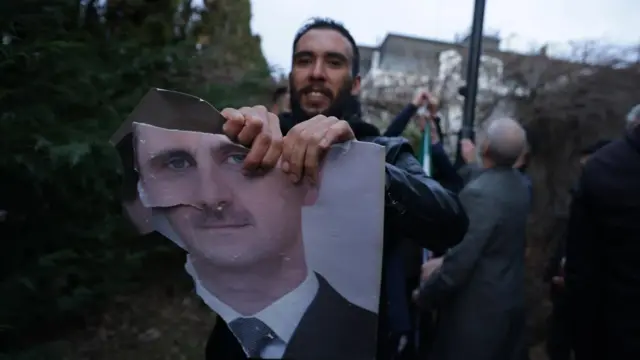 Image source, EPA
Image source, EPA
The end of the Assad rule will reshape the balance of power in the region. Iran, again, is seeing its influence suffer a significant blow. Syria under Assad was part of the connection between the Iranians and Hezbollah, the militia and political movement Iran supports in Lebanon. It was key for the transfer of weapons and ammunition to the group.
Hezbollah itself has been severely weakened after its war with Israel. In the most violent phase of the civil war, Iran sent advisers to Syria and Hezbollah deployed its fighters to help Assad crush the opposition. Russia, too, used its formidable air power. This time, however, they did not come to Assad’s rescue – and he was unable to survive on his own.
Iran has also seen the Houthis in Yemen being targeted in airstrikes. All these factions, plus militias in Iraq and Hamas in Gaza, form what Tehran describes as the Axis of Resistance, which has now been severely damaged.
This new picture will be celebrated in Israel, where Iran is viewed as an existential threat.
Many believe that this offensive could not have happened without the blessing of Turkey. For some time, President Erdogan had pressed Assad to engage in negotiations to find a diplomatic solution to the conflict that could allow the return of Syrian refugees. At least three million of them are in Turkey, and this is a sensitive issue locally. But Assad had refused to do so.
Turkey, which supports some of the rebels in Syria, has denied backing HTS, the Islamist group that led the insurgency.
HTS is sending conciliatory and diplomatic messages. But the dramatic changes could lead to a dangerous power vacuum and eventually result in chaos and even more violence.
This victory is for all Syrians, says rebel leaderpublished at 15:57 Greenwich Mean Time
Breaking
In Damascus, rebel leader Abu Mohammed al-Jawlani has addressed crowds at Umayyad mosque in the centre of the city.
He says Assad’s regime “imprisoned thousands of its own citizens unjustly and without any crime”, adding that “today, we are rewarded with this victory. This victory is for all Syrians.”
Rebel leader makes speech at Damascus mosquepublished at 15:49 Greenwich Mean Time
A little earlier we brought you news that the leader of Hayat Tahrir al-Sham has spoken to crowds at the Umayyad Mosque in Damascus.
Stay with us, we’ll be bringing you the latest from what Abu Mohammed al-Jawlani said.
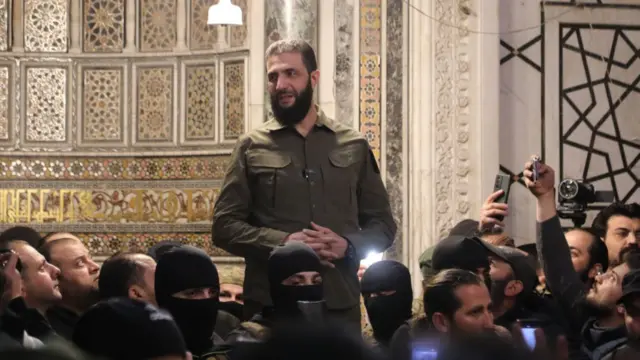 Image source, Getty Images
Image source, Getty Images
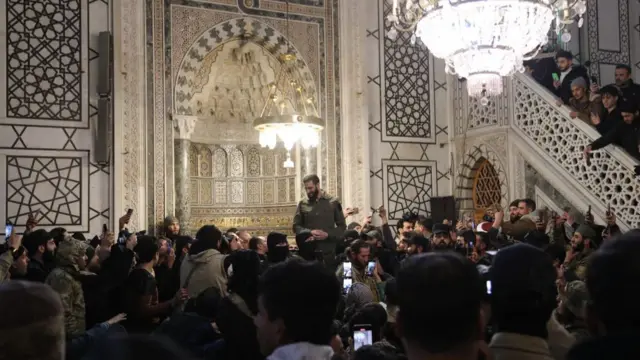 Image source, Getty Images
Image source, Getty Images

HTS leader not only player in Syria’s fast-changing futurepublished at 15:43 Greenwich Mean Time
Lyse Doucet
Chief international correspondent
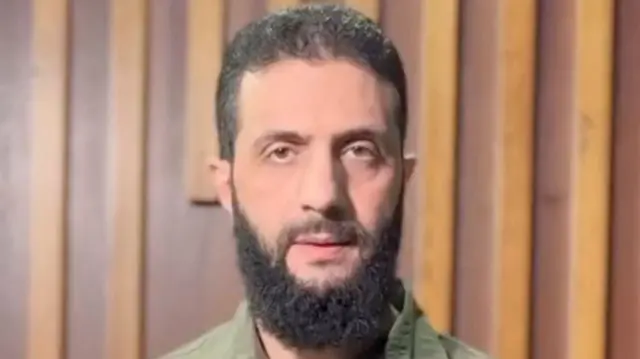 Image source, Reuters
Image source, Reuters
Abu Mohammad al-Jowlani
The leader of Hayat Tahrir-al Shams, Abu Mohammad al-Jawlani, triumphantly announced “the capture of Damascus”.
Now he’s using his real name, Ahmed al-Sharaa, rather than his nom de guerre as a sign of his sudden rise to a much greater national role.
He’s certain to play a decisive part in defining Syria’s new order after this sudden stunning end to a half century of repressive rule by the Assad family. But the leader of an organisation proscribed by the UN as well as western governments is not the only pivotal player on Syria’s fast shifting scene.
As the Islamist Hayat Tahrir-al Shams (HTS) pushed forward with astonishing speed, facing scant resistance, it sparked a rush by rebel forces in other regions of Syria as well as a surge of armed local groups keen to play a part in their own areas.
“Fighting the Assad regime was the glue that kept this de facto coalition together”, says Thomas Juneau, Middle East expert at the University of Ottawa’s Graduate School of Public and International Affairs, who is also in Doha.
“Now that Assad has fled, continued unity among the groups that toppled him will be a challenge,” he says.
Head of Hayat Tahrir al-Sham seen in Damascuspublished at 15:24 Greenwich Mean Time
Breaking
We’re seeing reports that the leader of Hayat Tahrir al-Sham (HTS), Abu Mohammed al-Jawlani, arrived in Damascus and has addressed crowds in the city’s landmark Umayyad Mosque.
A video circulating online has shown him speaking to a number of people inside the mosque.
The AFP news agency reports that the crowd chanted “Allahu akbar (God is greatest),” citing a video shared by rebel groups on Telegram.
UK prime minister welcomes fall of Assad’s ‘barbaric’ regimepublished at 15:05 Greenwich Mean Time
Breaking
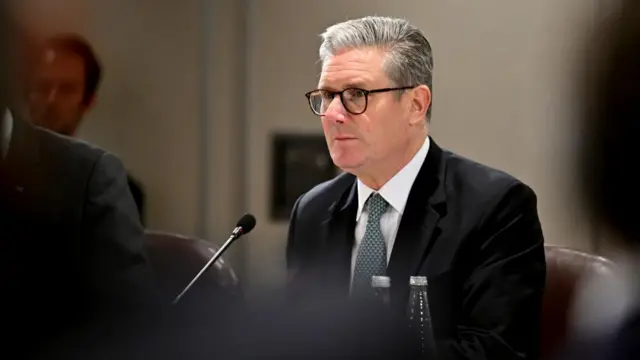 Image source, PA Media
Image source, PA Media
UK Prime Minister Sir Keir Starmer says he welcomes the fall of Bashar al-Assad’s “barbaric regime”.
The prime minister this afternoon called for “peace and stability” in the country.
“The developments in Syria in recent hours and days are unprecedented, and we are speaking to our partners in the region and monitoring the situation closely,” he adds.
“The Syrian people have suffered under Assad’s barbaric regime for too long and we welcome his departure.”
Questions continue over whereabouts of Assadpublished at 14:56 Greenwich Mean Time
David Gritten
BBC News
Bashar al-Assad has “left Syria”, his ally Russia says. A number of flights have left the capital, but it is not known if Assad was on any of them.
The head of the Syrian Observatory for Human Rights monitoring group reported that a plane believed to be carrying Assad “left Syria via Damascus international airport before the army security forces left” the facility. He said he had information that the plane was meant to take off at 22:00 local time (19:00 GMT) on Saturday.
The Flightradar24 website did not record a departure around that time, although a Cham Wings Airlines Airbus A320 passenger plane did leave at around 00:56 local time on Sunday bound for Sharjah in the United Arab Emirates (UAE).
The plane landed in Sharjah on time, but a diplomatic adviser to the president of the United Arab Emirates told reporters that he did not know if Assad was in the UAE.
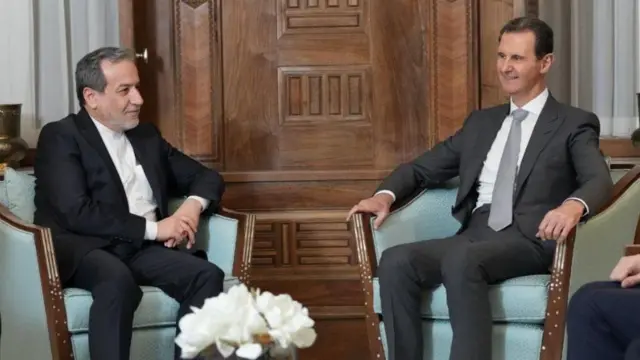 Image source, Reuters
Image source, Reuters
Bashar al-Assad’s last public appearance as president was last Sunday, when he met Iran’s foreign minister in Damascus
Reuters news agency meanwhile cited two unnamed senior Syrian army officers as saying that Assad had boarded a Syrian Air plane at Damascus airport early on Sunday. It noted that a cargo plane took off from the airport at 03:59 local time with an undisclosed destination.
According to data from Flightradar24, after flying over the central city of Homs, the plane made a U-turn and started flying eastwards while also losing altitude. The signal from the plane was lost shortly afterwards.
Flightradar24 said in a post on X that the aircraft was old and “so some data might be bad or missing”, and that it was “flying in an area of GPS jamming”.
There have not been any reports of a plane crash in the same area.
Black smoke and strikes heard in Damascuspublished at 14:51 Greenwich Mean Time
Lina Sinjab
Reporting from Damascus
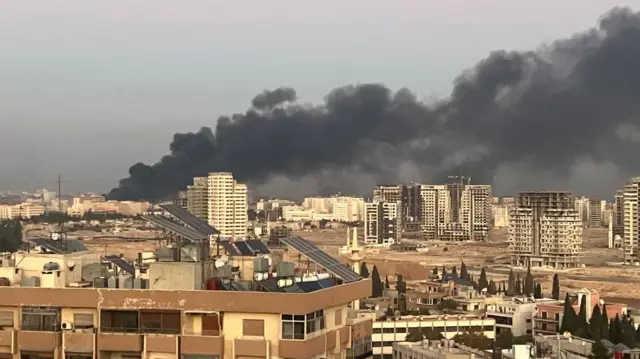
As the curfew gets under way, two explosions happened not too far from our hotel in Mezzeh.
We can see a plume of dark black smoke a few metres away from us.
The location is said to be the Marota City project, a housing development that belonged to businessmen under the Assad regime.
We have also been told there was another strike on Mezzeh airport behind us.
Concerns over where Syria goes from herepublished at 14:43 Greenwich Mean Time
James Landale
Diplomatic correspondent
There have been few tears shed for the Assad regime – but there are widespread concerns about the impact of its demise.
The UN’s special envoy to Syria, Geir Pedersen, said it was a “watershed moment” but only one of “cautious hope”. A senior Emirati diplomat, Anwar Gargash, said Syria’s territorial integrity was threatened by the risk of chaos, extremism and terrorism.
Daniel Shapiro, a senior Pentagon official, said US forces would remain in eastern Syria to combat the so-called Islamic State group which, he said, could exploit the “chaotic and dynamic circumstances” to step up its operations.
The Turkish foreign minister, Hakan Fidan, said he hoped millions of Syrian refugees could now return home.
Turkey in touch with Syrian rebels, foreign minister sayspublished at 14:33 Greenwich Mean Time
Turkey is in touch with rebels in Syria to make sure that “terrorist organisations” are not “taking advantage” of the situation, Turkish foreign minister Hakan Fidan said a little earlier.
He named the so-called Islamic State and the PKK, a Kurdish militant organisation, as the groups Turkey is particularly concerned about.
One of the key rebel factions in Syria – the Syrian National Army – is backed by Turkey.
“We have to be watchful during this transition period,” Fidan said at the Doha Forum in Qatar.
He added that “any possible chemical weapons inventory or related materials must be secured” and that a new government body should be “inclusive of all parties”, according to the Reuters news agency.
West welcomes Syrian rebellionpublished at 14:28 Greenwich Mean Time
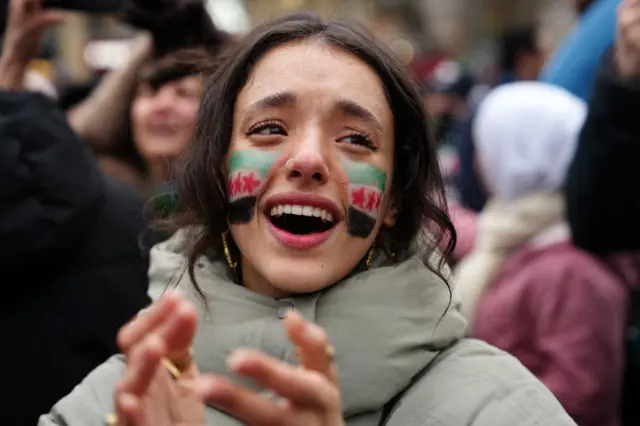 Image source, Getty Images
Image source, Getty Images
A woman in Paris applauds as members of the Syrian community gather to celebrate the fall Assad
Leaders from several Western countries have welcomed news today that Bashar al-Assad’s nearly 25-year rule has ended.
“Assad had fallen. This is how it has always been and will always be for dictators who bet on [Russian President Vladimir] Putin. He always betrays those who rely on him,” Ukraine’s Foreign Minister Andriy Sybiga says on social media.
Calling for calm after an armed group entered the Italian ambassador’s residence in Syria and took three cars, the country’s foreign minister Antonio Tajani says: “We are calling for a peaceful handover between the fallen regime and the new reality, so for a peaceful rather than military transition. It seems to me that at the moment things are going in this direction.”
Kaja Kallas, the EU’s High Representative for Foreign Affairs and Security Policy, writes on X: “The end of Assad’s dictatorship is a positive and long-awaited development. It also shows the weakness of Assad’s backers, Russia and Iran.”
She adds: “The process of rebuilding Syria will be long and complicated and all parties must be ready to engage constructively.”
